During the COVID-19 pandemic, the walk-in Pro Bono Clinics have been suspended until further notice. However, our Pro Bono Clinic remains in operation, in a remote capacity. See the flyer below for details.
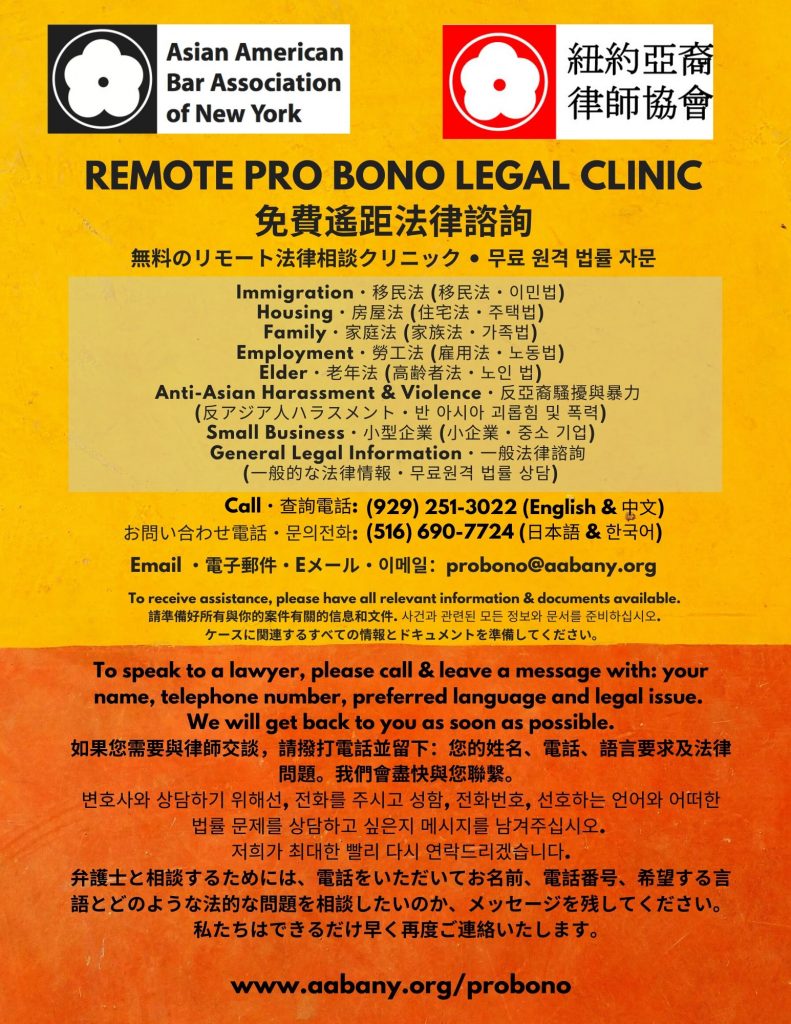
During the COVID-19 pandemic, the walk-in Pro Bono Clinics have been suspended until further notice. However, our Pro Bono Clinic remains in operation, in a remote capacity. See the flyer below for details.

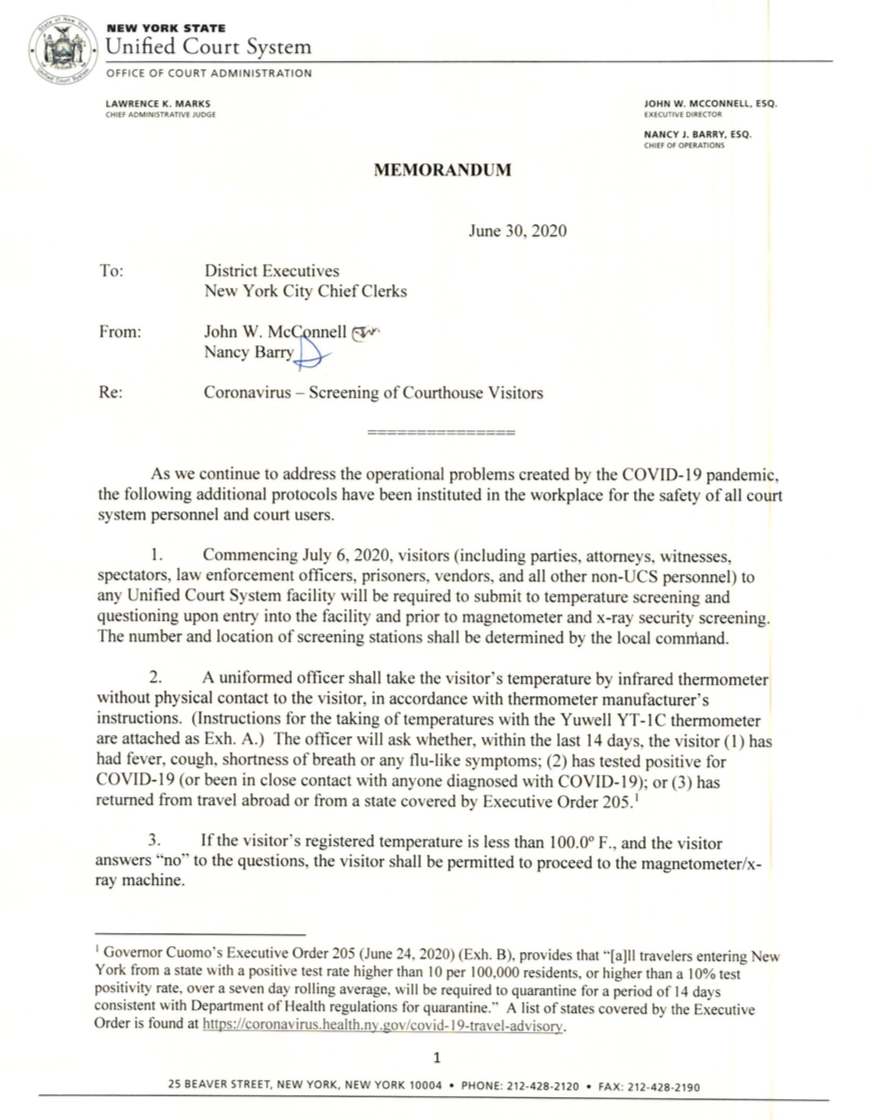
Beginning July 6, 2020, the Unified Court System will require all courthouse visitors to participate in questioning and a temperature screening. The changes come as New York begins to re-open and adjust following the COVID-19 pandemic.
A uniformed official will take the temperature of all visitors, including attorneys, witnesses, spectators, prisoners, law enforcement officials, and others, with an infrared thermometer, which requires no physical contact.
Visitors will be asked if in the last 14 days, the visitor has (1) experienced fever, cough, shortness of breath or any other flu-like symptoms; (2) tested positive for COVID-19 or been in close contact with anyone who has tested positive; (3) returned from travel internationally or from states covered by Executive Order 205.1.
If the visitor registers a temperature of 100º or below and answers ‘NO’ to the aforementioned questions, they will be permitted into the courthouse. If a higher temperature is recorded or visitors answer ‘YES’ to any of the questions, the courthouse will request additional information for the visitor and will not be let inside.
For more information or tread the complete memo, please click the image above.
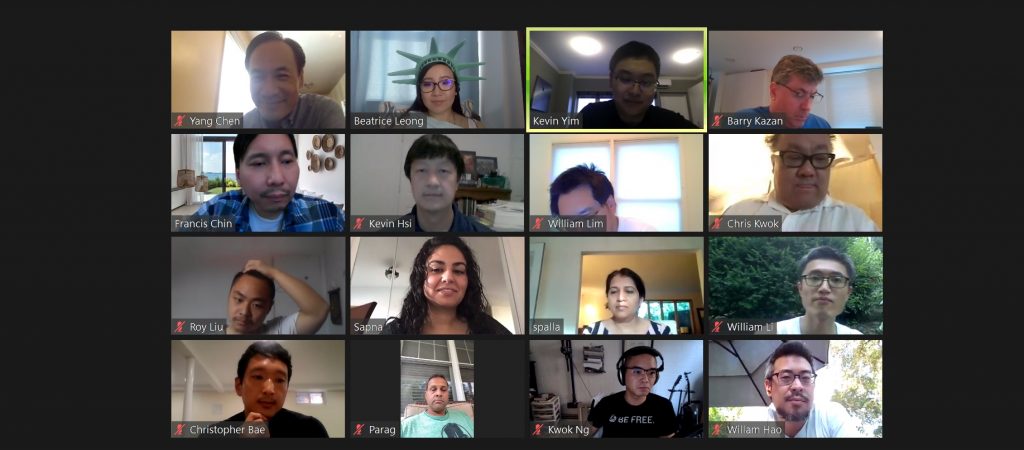
On June 26, 2020, the Membership Committee hosted their weekly Zoom Membership Mixer, with 16 participants in attendance. The icebreaker question posed to the participants was: “What is your family’s immigration story?” Members told their stories of how and why they or their families arrived in the United States or Canada. Some families came for school, marriages, and better opportunities. Some members made the trip to North America as an adult for a different life.
The Membership Committee previously hosted Monthly Mixers at bars and various other venues, such as ballparks and the Metropolitan Opera, but due to COVID, we have moved online to offer members a weekly outlet to share their feelings, see old friends, and make new connections. Mixers start at 6:30pm on Friday and the main event ends at 7:30pm but feel free to stay on after 7:30pm for smaller breakout groups.
Membership Committee will continue to host weekly Zoom mixers until it is safe to gather together again in person.
This week, after the main mixer, a breakout group of 6 members discussed the next steps of re-opening phases in New York City.
Watch out for the AABANY Talent Show coming on July 17! If you have a talent, such as singing, dancing, musical instruments, telling jokes, karate, etc., please email us at membership@aabany.org. See the flyer or go to https://www.aabany.org/events/event_details.asp?legacy=1&id=1393375 to register.
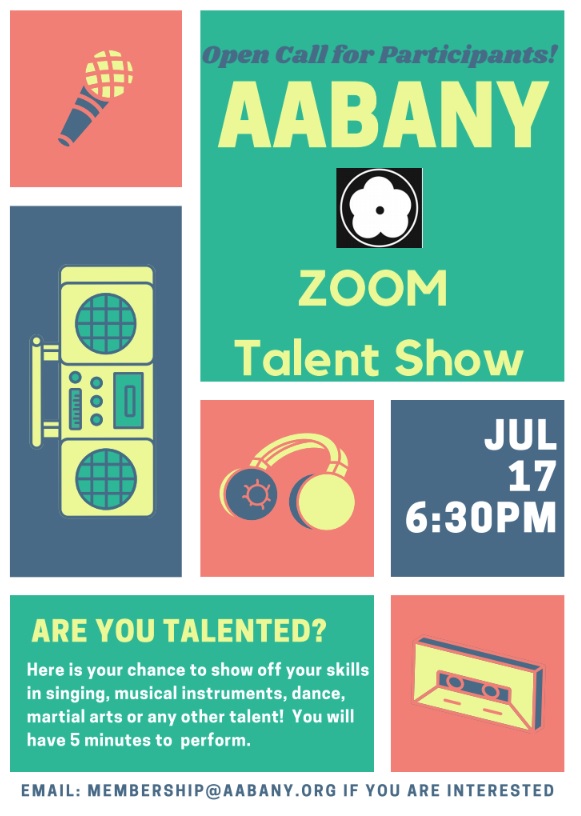
We have been giving away door prizes at prior mixers. In order to win, you must be a member and must RSVP on the aabany.org calendar entry to get a raffle number. Non-members can join the Zoom mixer but won’t be eligible to win a prize.
Mixers are not recorded, and are LIVE, so don’t miss out.
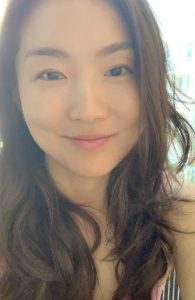
We are pleased to welcome AABANY member Jane Jeong to our blog with this post sharing some personal reflections during these challenging times.
“OK. But, Jane… who says that upside down will definitely be worse than right-side up?” He pauses for a breath to let that truly sink in. “Maybe,” he continues, “this is just evolution. Painful, yes. Scary, yes. But it could also be just what we need.”
Simon is my patient, no-bullshit-giving life coach, whom I met earlier this year mainly because (1) my firm offers free therapy to its attorneys, and (2) I never turn down free stuff. I called him because it was one PM on a Tuesday and I found myself crawling back to bed yet again, seeking refuge from the endless merger agreements I needed to redline and the constant stream of cataclysmic news alerts bombarding my phone. The world is turning upside down, I told him, and I am utterly exhausted. Exhausted from all the nights I have lied awake lately, wondering when I will get to hug my friends and family again. Exhausted from all the pain—all the lives and day-to-day normalcy we lost in this weird and senseless pandemic. Exhausted from all the anger, absorbing the depths of our heartbreak as we reel from yet another blow of systemic racism.
Perhaps Simon is right (I pray that he is). Perhaps, on the other side of all this, we will eventually find that upside down really was exactly what we needed. History proves that calamity is often the catalyst for change, after all. But none of this changes the fact that the last couple of months have just plainly sucked, with all the utterly terrifying things going on in the world awakening our inner demons—demons like Fear, Loneliness, Anxiety, Insecurity, and Depression… and whatever else we face behind closed doors but do not speak openly about.
I suspect I am far from the only one here who has confronted these guys lately. We hyper-achieving, Type-A attorneys tend to be fraught with higher levels of depression and anxiety as is, and these challenges only multiply once we sprinkle in the additional dimensions of being Asian American or immigrant or female (or all of the above, in my case). Even before the inexplicable mess of 2020, we Asian American attorneys consistently reported higher rates of mental health challenges than the broader population of lawyers as a whole, with half of us reporting some history of moderate to severe depression or anxiety.
These hiccups in our emotional wellbeing are perhaps rooted in the pressures of our culture: The pressure to be perfect and pleasing, the pressure to achieve, the pressure to obey, the pressure to prove our self-worth to the world with fancy degrees and fancy paychecks and fancy houses. We worship at the temples of Achievement and Perfection from day one, scoring straight-As and first-chair orchestra seats like all “good Asians” do. We are taught to constantly look upward to the next rung on the ladder—the first-place trophy, the valedictorian speech, the Ivy-League degree—and seek nothing but the best at all costs. And when we place external validation on a pedestal in this way, it becomes difficult, if not impossible, to accept that we are inherently enough: There will always be something more to achieve—to close the ever-persistent gap between who we are and who we “should” be. And wherever that gap persists, it becomes all too easy for us to turn on ourselves—for all of those pesky insecurities and self-doubts to swoop in and take residence in our hearts.
I know these pressures and inner demons all too well. For most of my life, my ambition was my master: Its militant discipline and rigid motor were what propelled me through Yale College and Harvard Law and my shiny careers in law and finance. Fourteen-hour workdays and ten-mile runs were my regular repertoire. I was so proud of how fiercely disciplined and accomplished I was—feeding myself on other people’s compliments and admiration, never once considering the idea that my drive stemmed not from inherent greatness but from inherent fear. Fear of being unworthy. Fear of what it would mean if I did not have that perfect resume, that perfect body, that perfect hair. Fear of what it would mean if people didn’t think I was likeable or successful or beautiful. And so, I should-ed the crap out of myself. By the time I approached thirty—the age I always equated with fully formed adulthood, as if “being an adult” were some kind of destination—I made it my business to have everything I was told I should want: That perfect-on-paper fiancé—a tall, broad, Yale Law grad in my Summer Associate class—who was already researching good suburban school districts for our future kids. That shiny, six-figure lawyer job at a prestigious firm in New York City, which made my loving Korean parents beam with pride. That sleek junior-one-bedroom a block away from Central Park, brimming with the latest and greatest Vitamixes and Dysons one could possibly need for the said children she was expected to have.
But… was I actually happy?
This question astounded me at first. Because for thirty years, I never once paused to ask what would even make me happy in the first place. Because I never gave myself the luxury to pause in my Energizer-bunny pace of life; I was too busy checking off to-do lists, pleasing bosses, acing exams, disciplining my sugar intake, and putting on no fewer than five layers of SPF. Whatever made me smarter, better, richer, thinner, more successful, and more beautiful were the only matters worthwhile. But questions of happiness? Matters of the heart? Well… those things just got in the way, slowing me down and threatening to stain that perfect image I had hustled to project out into the world. Any doubts I had, I numbed by myself in my darkest corners, far away from prying eyes, before cajoling myself to sleep and pulling it all back together the next morning with a plastered smile on my face. I never allowed myself a moment to slow down, catch my breath, and ask whether the life I was hustling so hard to build was truly my own.
Silencing my heart in this way worked ridiculously well for a long time… until it didn’t. Perhaps it was inevitable. Or, perhaps, all the additional pressures I began facing—the grueling big law hours, the daunting foreverness of a looming marriage, the unforgiving expectations on minority female professionals in their thirties—were heavy enough to finally tip the scales for me. Regardless of the exact reason, however, the end result was very clear: My heart—after being ignored and silenced for nearly three decades—finally had enough. It began to betray me, cracking open under all that pressure and allowing Depression to gallantly swoop inside.
Once nestled, Depression swiftly swallowed me whole with its three vicious heads. First came Shame. People who equate Depression with pure sadness don’t immediately understand this: It is actually the sharp tentacles of Shame—not sadness—that initially gut you. Shame was cruel and ruthless to me, riling up every deep-seated parcel of self-doubt and making it impossible for me to function any longer. It played highlight reels of the most flawed parts of me—all the ugly ways I was selfish, petty, mean, unforgiving, conniving, cruel, utterly unlovable—and demanded that I reckon with them. That I stop cowering away from the weak, imperfect, and never-good-enough woman I really am. It was pathetic, Shame said, that I needed to armor myself with degrees and money and makeup just to prove to the world that I was enough. Parading around and showcasing to the world only the best parts of me—the easily digestible parts of myself that were smart and pretty and flirty—didn’t I know that’s not me? Didn’t I know that I will never be enough, no matter how much I try?
Once Shame sufficiently shrunk me down to size, Depression then unleashed Guilt. And Guilt was all too happy to shatter me and slap me around, doing all sorts of weird things to weaponize my mind and proving what a spoiled asshole I was. Because how dare I have second thoughts about my life—the very one I had hustled so hard to create? How could I be so entitled? Yes, perhaps I was discovering that I may no longer want to be engaged to this perfect-on-paper man … but didn’t I know how hard it is to find a suitable life partner? Didn’t I know how many single women in New York would trade places with me in a second, sporting that huge diamond ring signifying evermore security in the future? And speaking of security—yes, perhaps I should have figured that corporate tax law was not going to be my jam… but didn’t I know how lucky I was to have that steady, plump paycheck coming my way twice a month? All adults are tired and bored by their jobs; that’s part of the deal. Just like taxes and student loan payments and, one day, rearing children of my own—all these things, grown-ups just do. If I have any doubts, swallow them. Because who was I to say that all this wasn’t enough for me? Who did I think I was?
Depression’s third and final weapon was Despair, which was one of the most powerful yet ephemeral, all-consuming yet erratic, familiar yet foreign experiences I had ever tasted to date. It was so physically crushing that I regularly went to bed at night resting my palm across my heart—afraid it might actually break inside my body—and wondering if this was just the way I was going to end all my days from now on. I still found familiar glimpses of myself, even in the thickest part of this fog—like, for instance, the merciful snippets of quiet that greeted me every morning, if only for a few seconds, before my body realized I was awake and once again blanketed itself with the sorrow and loneliness it had hung out to dry the night before. For the remainder of my hours, though, I carried Despair with me, crushing myself under its hefty weight wherever I went and expending every ounce of energy to just survive the day. I knew on some level this was not me but rather some other energy taking over me, but even that I was not entirely certain—maybe this had just been me all along. I was not entirely certain of anything, perhaps, other than the cruel reality that I simply had nowhere left to go. I was already parked at my last resort.
It was only when I hit the darkest depths of Despair—utterly depleted, immobilized on the floor of that sleek Upper West Side apartment, accepting nothing else but the fact that I was alone and cornered—when my heart began speaking to me again.
And I actually began to listen, for the first time in my life…
Because I no longer had the energy to run away from myself.
Because it was finally quiet enough for me to hear my own voice.
Because… well, what other options did I have?
That conversation started off so small, so plain—because small and plain were all I could afford at the time. I did not know exactly what my heart needed to be happy, but I knew it needed something different—something more me. And since my evenings and weekends were still at the mercy of big law, I began waking up at the crack of dawn, well before anyone began asking anything of me, if only to give myself the simple privilege of being accountable to no one else for just a sliver of the day. And with that new pocket of time, I exercised, read, journaled, prayed, painted, danced, meditated, or took aimless strolls through our city. Other times, I simply went back to sleep. I also began setting a standing calendar appointment every day at four PM, simply to pause for fifteen minutes and give myself permission to do whatever else I wanted—like fetching an oat milk latte or calling an old friend for a quick hello. I started going to therapy and got in touch with my inner child. I chatted up my mom and dad, my best friends, my ex-flings, my coworkers, my bosses, my former professors, my other Simons—anyone else who might know a thing or two—and asked how they managed to figure all this out (answer: no one really has). I filled my commutes with podcasts and motivational speeches from every spiritual and religious teacher I could find. I sent out random affirmations out into the world all throughout the day, asking the Universe for inner peace and grace. For the first time in my life, I was learning how to do whatever I wanted purely for the pleasure of it—without any regard for its purpose or end goal.
Nothing really seemed to change at first. But little by little, over the next few months, two truths began to surface in my heart:
All this is why I believe it’s more important than ever for us to lead a different, more authentic, dialogue here. There is not much I am certain of these days—it really does seem like the world has turned upside down and, Simon’s wisdom notwithstanding, upside down does genuinely feel crappy sometimes. But if there is one thing I know for sure, it is this: There are too many of us who are sitting at home in pain right now. There are too many of us who need a reminder that we are not alone, that this too shall pass. There are too many of us who can afford to be a lot kinder to ourselves—to let go of who we think we “should” be and learn to see all the beautiful contradictions of who we truly are.
So guys… let’s step it up and create that safe space for each other. I am tired of the mindless small talk and awkward Zoom icebreakers—let’s give up the jig and instead give each other the freedom to show up imperfectly. Let’s have some no-bullshit conversations on what we are going through and how we can help each other through an incredibly uncertain time. Because we have all been there, in some form or another.
Because it really is OK not to be OK.
If you are interested in joining this dialogue with me and other AABANY members, please reach out at jane.jeong@gmail.com for more information.
Jane Jeong is an Associate at Cooley in New York City.
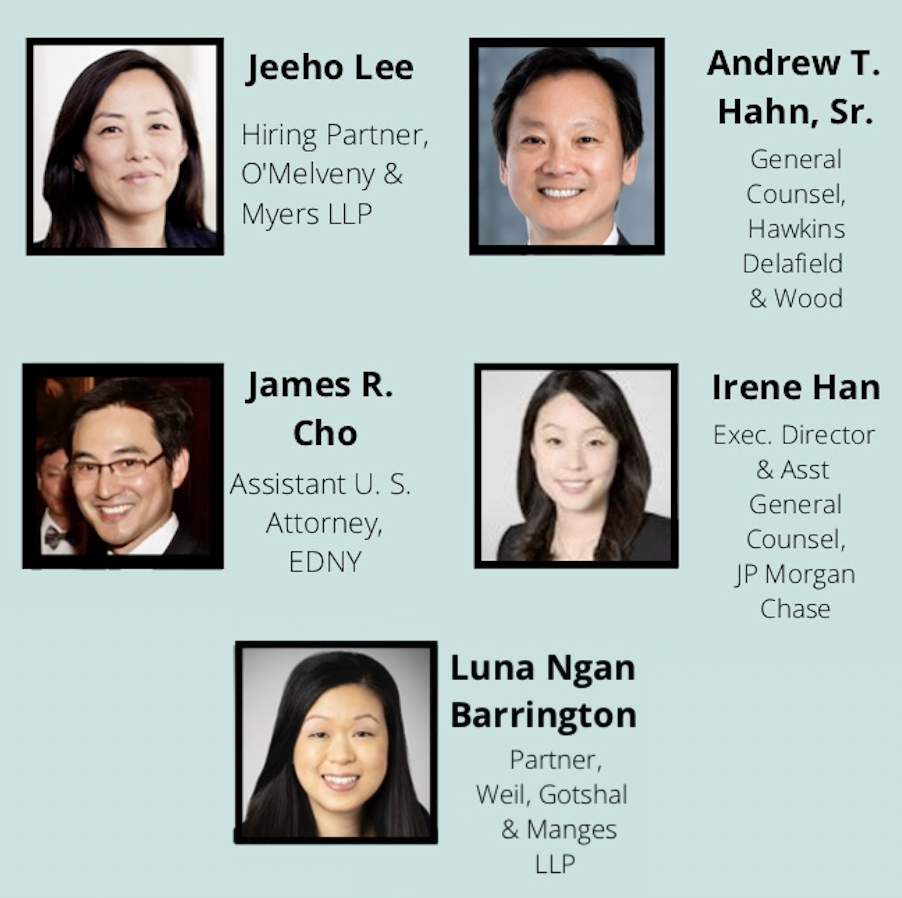
On June 15, 2020, the Student Outreach Committee of the Asian American Bar Association of New York (AABANY) hosted a webinar discussing how to succeed in virtual summer programs. Moderated by James Cho, an Assistant United States Attorney with the Eastern District of New York in Brooklyn and past president of AABANY, the panel featured: Luna Barrington, Partner at Weil, Gotshal & Manges LLP; Jeeho Lee, Hiring Partner at O’Melveny & Myers LLP; Andrew T. Hahn, Sr., General Counsel at Hawkins, Delafield & Wood; and Irene Han, Executive Director and Assistant General Counsel at JP Morgan Chase.
The panel first addressed what their current firms and organizations were offering for their summer programs, given the challenges of COVID-19. Jeeho Lee explained that the summer programs at O’Melveny & Myers LLP were shortened to six weeks and will be all virtual, but the firm guaranteed offers to all 2L summer associates, and that 1L summer associates were guaranteed positions for the summer of their second year. She emphasized that the staff wants to ensure that the summer program remains an opportunity for the firm to set up a platform for students to build a network with other lawyers. Luna Barrington’s firm, Weil, offered a 10-week program, which featured virtual social events, encouraged students to network, and extended offers to 1L and 2L summer associates. James Cho stated that all of his interns were assigned an Assistant U.S. Attorney to work with and that the program was completely virtual.
Andrew Hahn Sr., who also previously served as President of AABANY and NAPABA, encouraged summer associates and interns to have strong core competencies–reading, writing, and speaking skills–and to also practice their soft skills, especially in regards to social interactions and leadership. Luna Barrington encouraged individuals partaking in summer programs to make an extra effort to go out and meet people at the firm through virtual programs and to be proactive in seeking assignments as a way to distinguish themselves. Irene Han highlighted the importance of demonstrating a learning mindset, active engagement during virtual events (including turning on your video and microphone during meetings), and leadership. Jeeho Lee warned the audience to not take a guaranteed offer for granted, but to remain engaged and build a strong reputation. She also stressed that individuals should make relationships that expand their horizons. Finally, James Cho advised summer associates and interns to be heard, proactive, and present.
Irene Han gave the audience a few basic presentation tips, including dressing in business casual and meeting the cultural expectations of the firm. Jeeho Lee added that individuals should always try to dress professionally, even if others are dressed in casual attire.
When asked how to respond when an attorney is very busy and does not respond to emails and set hard deadlines, the panel suggested that the individual find another person that works with the assigned partner and ask through them. The panel also advised summer associates and interns not to ask to work in person unless the firm announces that it is opening up. They also encouraged individuals to schedule coffee chats with other members of the firm and attend company social events. The panel advised individuals to avoid excessively apologizing for mistakes or not knowing the answers to questions, but rather, to only apologize when it is appropriate and to be direct. Finally, the panelists explained that there may likely be many firms that do not give returning offers to many summer associates due to external factors, but that individuals should ask the HR manager or the director of the summer program for advice for the following summer.
We thank the panelists for their time and the Student Outreach Committee for organizing this informative discussion. For more information on the Student Outreach Committee, see https://www.aabany.org/page/121.
For Immediate Release:
Date: June 18, 2020
Contact: Priya Purandare, Executive Director
Email: ppurandare@napaba.org
Today, in a 5-4 landmark decision, the U.S. Supreme Court ruled that the Trump administration’s decision in 2017 to end Deferred Action for Childhood Arrivals (DACA) violated federal law in Department of Homeland Security v. Regents of the University of California. The DACA program, whose beneficiaries are also known as DREAMers, protects eligible undocumented youth from deportation and provides them with work permits. Approximately 650,000 individuals, including more than 16,000 Asian Americans and Pacific Islanders (AAPIs), benefit from this program and about 120,000 AAPIs are eligible for DACA. The National Asian Pacific American Bar Association (NAPABA) applauds the Court for its decision, which will protect these individuals, many of whom are the sole providers in their families.
“The Court’s decision ensures the protection of hundreds of thousands of undocumented immigrants who were brought to the United States as children. These DREAMers now know they are currently safe from being suddenly deported from the country in which they grew up, went to school, and now work,” said Bonnie Lee Wolf, President of NAPABA. “There has been strong bipartisan support in Congress to protect DREAMers, who significantly contribute to their communities in the United States. The Court’s decision is not a permanent fix and Congress needs to act. NAPABA remains committed to protecting DREAMers.”
NAPABA’s policy resolution to support the continuation of DACA recipients can be found here and the original resolution to support DACA recipients can be found here. The Supreme Court decision can be found here.
Sharon and Ivan Fong recently began a scholarship fund for rising 2L law students who demonstrate outstanding professional promise, community service, and commitment to the APA community.
Applicants will be evaluated for (a) academic excellence in their undergraduate school years and first year of law school, (b) leadership experience, (c) volunteerism or service in the public interest, (d) knowledge of social and cultural issues of any one or more AAPI communities or commitment to making a significant impact on issues affecting one or more AAPI communities, or both, and (e) commitment to “pay it forward.”
The NAPABA Law Foundation will award from the Sharon and Ivan Fong Scholarship Fund at least one $5,000 scholarship each year, half of which would be distributed to the recipient in his or her second year of law school and the remainder of which would be distributed to the recipient in his or her third year of law school.
Applicants must apply by June 30, 2020 at 5:00 PM ET. However, if applicants submit all but the reference letters by the deadline (and commit to getting the references in soon thereafter), applications will not be considered late.
For more information, please visit the Scholarship page on the NAPABA Law Foundation website.
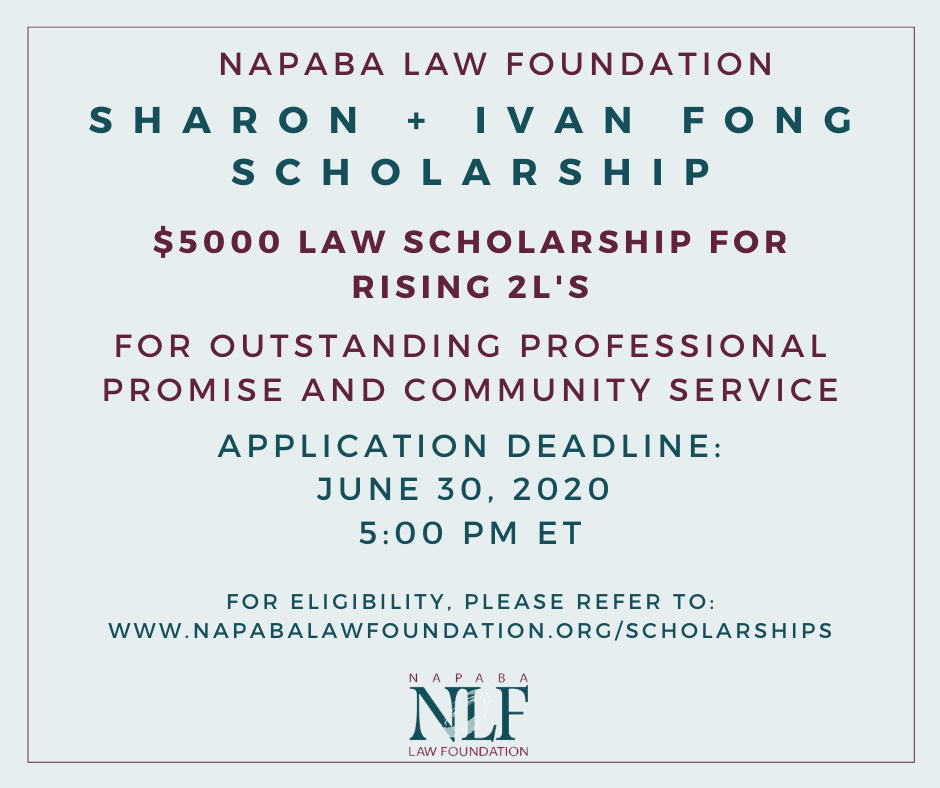
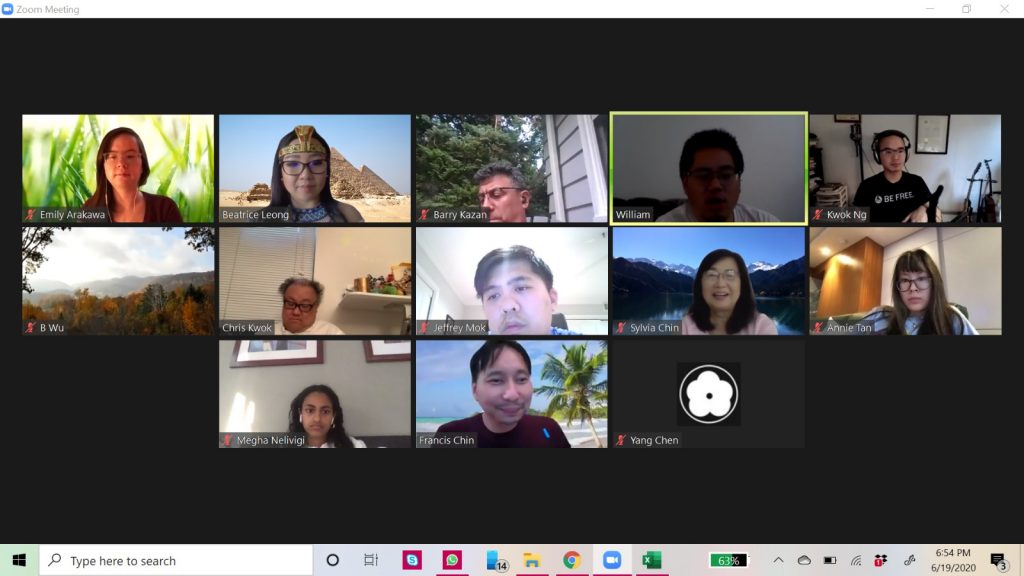
On June 19, 2020, the Membership Committee hosted their weekly Zoom Membership Mixer, with 15 participants in attendance. The icebreaker question posed to the participants was: “Which historical figure, living or deceased, would you most like to meet?” Members wanted to meet Cleopatra, Yuri Kochiyama, Shakespeare, Jane Austen, Robin Williams, Michelangelo, Ruth Bader Ginsburg, Isaac Asimov, Harriet Tubman, and Ben Franklin.
The Membership Committee previously hosted Monthly Mixers at bars and various locations, but due to COVID, we have moved online to offer members a weekly outlet to share their feelings, see old friends, and make new connections. Mixers start at 6:30pm on Friday and the main event ends at 7:30pm but feel free to stay on after 7:30pm for smaller breakout groups.
Membership Committee will continue to host weekly Zoom mixers until it is safe to gather together again in person.
This week, after the main mixer, a breakout group of 4 members stayed behind to play “Cards Against Humanity.” We will feature this game in future Mixers!
We are giving away door prizes in some weeks. In order to win, you must be a member and must RSVP on the calendar entry at aabany.org to get a raffle number. Non-members can join the Zoom mixer but won’t be eligible to win a prize.
Mixers are not recorded, and are LIVE, so don’t miss out. Join us this week June 26, as we host our friends from SABANY. Register by June 25 at https://www.aabany.org/events/event_details.asp?legacy=1&id=1366641.
On June 19, 2020, USA Today published an Op-Ed written by Ryan D. Budhu, a member of the Asian American Bar Association of New York (AABANY) and past president of the South Asian Bar Association of New York (SABANY).
In the article, Budhu recounts his personal experience with police brutality, when his brother died in the custody of the NYPD. He also reflects on this tragedy in relation to the death of George Floyd, and the need for allyship between South Asian and Black communities. He writes: “I have a duty to listen to and help address inequities, especially those that affect Black lives within the circles that I occupy.”
To read the full article, click here.
Dear NAPABA Community,
As a result of the ongoing COVID-19 pandemic and in consideration of the safety and well-being of our members and attendees, NAPABA has postponed all in-person events for the remainder of 2020—the Regional Conference in Charlotte, NC and the NAPABA Convention in Los Angeles, CA.
NAPABA is planning a dynamic virtual conference in place of the 2020 NAPABA Convention scheduled for Nov. 5-8. We know that the need to connect is powerful, even more so during these unprecedented times. We pledge to use this opportunity to expand the breadth of our reach and explore new ways to keep you informed, engaged, and connected on a global scale.
You will have an exceptional opportunity to visit with old friends and meet new ones, hear recognized experts share insights, identify new business opportunities, and further propel your career trajectory—all from the safety and comfort of your home. The NAPABA virtual experience will be a unique and engaging forum that will bring our community together and serve to touch and inspire each one of us—a NAPABA FOR ALL!
More information about NAPABA’s virtual conference in November will roll out over the summer as we finalize the details. Please make plans to join us for the largest virtual gathering of Asian Pacific Americans attorneys and law students—without the airfare add-ons and travel-sized toiletries.
Thank you for your commitment and support of NAPABA.